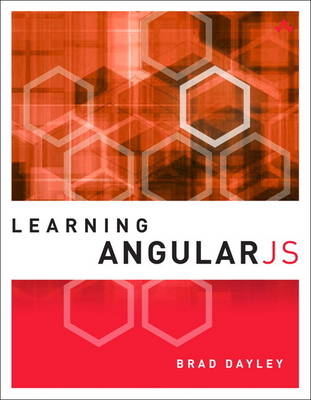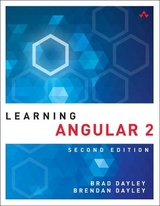
Learning AngularJS
Addison-Wesley Educational Publishers Inc (Verlag)
978-0-13-403454-6 (ISBN)
- Titel erscheint in neuer Auflage
- Artikel merken
Get started with AngularJS web development fast
AngularJS is one of the most exciting and innovative new technologies emerging in the world of web development. Designed to simplify the development and testing of web applications, it also provides structure for the entire development process.
Websites are no longer simple static content–instead, websites have become much more dynamic, with a single page often serving as the entire site or application. And AngularJS allows web developers to build the necessary programming logic for such applications directly into a web page, binding the data model for the client web application to backend services and databases. AngularJS also allows the extension of HTML so that the UI design logic can be expressed easily in an HTML template file.
Learning AngularJS shows you how to create powerful, interactive web applications that have a well-structured, reusable code base that will be easy to maintain. You’ll also learn how to leverage AngularJS’s innovative MVC approach to implement well-designed and well-structured web pages and web applications.
Understand how AngularJS is organized and learn best practices for designing AngularJS applications
Find out how to define modules and utilize dependency injection
Quickly build AngularJS templates with built-in directives that enhance the user experience
Bind UI elements to your data model, so changes to your model and UI occur automatically in tandem
Define custom AngularJS directives that extend HTML
Implement zoomable images, expandable lists, and other rich UI components
Implement client-side services that interact with web servers
Build dynamic browser views to provide even richer user interaction
Create custom services you can easily reuse
Design unit and end-to-end tests for AngularJS applications
Contents at a Glance
1 Jumping Into JavaScript
Setting Up a JavaScript Development Environment Using Node.js
Defining Variables
Understanding JavaScript Data Types
Using Operators
Implementing Looping
Creating Functions
Understanding Variable Scope
Using JavaScript Objects
Manipulating Strings
Working with Arrays
Adding Error Handling
2 Getting Started with AngularJS
Why AngularJS?
Understanding AngularJS
An Overview of the AngularJS Life Cycle
Separation of Responsibilities
Integrating AngularJS with Existing JavaScript and jQuery
Adding AngularJS to Your Environment
Bootstrapping AngularJS in an HTML Document
Using the Global APIs
Creating a Basic AngularJS Application
Using jQuery or jQuery Lite in AngularJS Applications
3 Understanding AngularJS Application Dynamics
Looking at Modules and Dependency Injection
Defining an AngularJS Module Object
Creating Providers in AngularJS Modules
Implementing Providers and Dependency Injection
Applying Configuration and Run Blocks to Modules
4 Implementing the Scope as a Data Model
Understanding Scopes
Implementing Scope Hierarchy
5 Using AngularJS Templates to Create Views
Understanding Templates
Using Expressions
Using Filters
Creating Custom Filters
6 Implementing Directives in AngularJS Views
Understanding Directives
Using Built-in Directives
7 Creating Your Own Custom Directives to Extend HTML
Understanding Custom Directive Definitions
Implementing Custom Directives
8 Using Events to Interact with Data in the Model
Browser Events
User Interaction Events
Adding $watches to Track Scope Change Events
Emitting and Broadcasting Custom Events
9 Implementing AngularJS Services in Web Applications
Understanding AngularJS Services
Using the Built-in Services
Using the $q Service to Provide Deferred Responses
10 Creating Your Own Custom AngularJS Services
Understanding Custom AngularJS Services
Integrating Custom Services into Your AngularJS Applications
11 Creating Rich Web Application Components the AngularJS Way
Building a Tabbed View
Implementing Draggable and Droppable Elements 204 Adding a Zoom View Field to Images
Implementing Expandable and Collapsible Elements
Adding Star Ratings to Elements
A Testing AngularJS Applications
Deciding on a Testing Platform
Understanding AngularJS Unit Tests
Understanding AngularJS End-to-End Testing
Brad Dayley is a senior software engineer with over 20 years of experience developing enterprise applications and Web interfaces. He has a passion for new technologies, especially ones that really make a difference in the software industry. He has used JavaScript, jQuery, and AngularJS for years and is the author of Node.js, MongoDB and AngularJS Web Development (Addison-Wesley Professional), jQuery and JavaScript Phrasebook (Addison-Wesley Professional), and Sams Teach Yourself jQuery and JavaScript in 24 Hours (Sams Publishing). He has designed and implemented a wide array of applications and services from application servers to complex 2.0 web interfaces.
1 ¿Jumping Into JavaScript
Setting Up a JavaScript Development Environment Using Node.js
Defining Variables
Understanding JavaScript Data Types
Using Operators
Implementing Looping
Creating Functions
Understanding Variable Scope
Using JavaScript Objects
Manipulating Strings
Working with Arrays
Adding Error Handling
2 ¿Getting Started with AngularJS
Why AngularJS?
Understanding AngularJS
An Overview of the AngularJS Life Cycle
Separation of Responsibilities
Integrating AngularJS with Existing JavaScript and jQuery
Adding AngularJS to Your Environment
Bootstrapping AngularJS in an HTML Document
Using the Global APIs
Creating a Basic AngularJS Application
Using jQuery or jQuery Lite in AngularJS Applications
3 ¿Understanding AngularJS Application Dynamics
Looking at Modules and Dependency Injection
Defining an AngularJS Module Object
Creating Providers in AngularJS Modules
Implementing Providers and Dependency Injection
Applying Configuration and Run Blocks to Modules
4 ¿Implementing the Scope as a Data Model
Understanding Scopes
Implementing Scope Hierarchy
5 ¿Using AngularJS Templates to Create Views
Understanding Templates
Using Expressions
Using Filters
Creating Custom Filters
6 ¿Implementing Directives in AngularJS Views
Understanding Directives
Using Built-in Directives
7 ¿Creating Your Own Custom Directives to Extend HTML
Understanding Custom Directive Definitions
Implementing Custom Directives
8 ¿Using Events to Interact with Data in the Model
Browser Events
User Interaction Events
Adding $watches to Track Scope Change Events
Emitting and Broadcasting Custom Events
9 ¿Implementing AngularJS Services in Web Applications
Understanding AngularJS Services
Using the Built-in Services
Using the $q Service to Provide Deferred Responses
10 ¿Creating Your Own Custom AngularJS Services
Understanding Custom AngularJS Services
Integrating Custom Services into Your AngularJS Applications
11 ¿Creating Rich Web Application Components the AngularJS Way
Building a Tabbed View
Implementing Draggable and Droppable Elements 204 Adding a Zoom View Field to Images
Implementing Expandable and Collapsible Elements
Adding Star Ratings to Elements
A ¿Testing AngularJS Applications
Deciding on a Testing Platform
Understanding AngularJS Unit Tests
Understanding AngularJS End-to-End Testing
| Erscheint lt. Verlag | 23.12.2014 |
|---|---|
| Verlagsort | New Jersey |
| Sprache | englisch |
| Maße | 181 x 231 mm |
| Gewicht | 426 g |
| Themenwelt | Mathematik / Informatik ► Informatik ► Web / Internet |
| ISBN-10 | 0-13-403454-6 / 0134034546 |
| ISBN-13 | 978-0-13-403454-6 / 9780134034546 |
| Zustand | Neuware |
| Haben Sie eine Frage zum Produkt? |
aus dem Bereich



